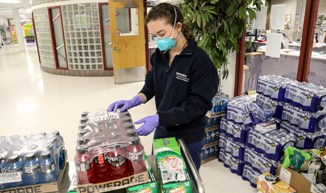
“When we started hearing at the end of February from colleagues working with the homeless on the West Coast—especially in Seattle—we knew we needed to think about how to help our homeless here self-isolate and maintain social distancing since they could not do so in transitional homes or shelters,” said David I. Rosenthal, M.D., the Medical Director of Homeless PACT for VA Connecticut Healthcare System and an Assistant Professor for Yale School of Medicine..
Local shelters, with guidance from the state of Connecticut, started a program in mid-March to move the homeless, especially those who were more vulnerable, to hotels where social distancing was possible.
However, an issue arose about how to help those recovering from COVID-19 who were still sick and needed respite care but were not sick enough to stay in overwhelmed hospitals. Within a week, a strategic medical respite plan was created with the City of New Haven, the mayor’s office, the Columbus House, and other organizations and volunteers. The Hill Regional Career High School’s gymnasium, a designated emergency shelter location, was chosen. The facility accepted its first patient on April 9 with beds available for up to 50 patients. As of the end of April, the facility was serving eight people.
“While shelter personnel would normally staff the homeless shelter, they didn’t feel comfortable in a medical setting,” said Dr. Rosenthal. Instead, 30-40 Medical Reserve Corps volunteers, including Stacey and Ari Wyner, work in 8-hour shifts with at least two medical personnel in the “contamination zone.”
“[This] has been a life lesson on how we can come together and make our world a better, safer pfor a group of people that otherwise would have no safe place to complete their isolation time following a Covid-19 diagnosis,” says Stacey Wyner, a nurse on temporary leave from her nurse practitioner position in a school-based clinic at Hamden High.
As part of the New Haven mayor’s office commitment to the community, there is 24-hour police coverage at the facility to maintain staff security and ensure those still recovering don’t venture into the community next door. There haven’t been any problems, reassures Dr. Rosenthal.
“To make the place a respite and as comfortable as best we can, we need to get their basic needs met and provide them with engagement,” explains Dr. Rosenthal. “With donations, we were able to get 15 tablets so patients could surf the internet. ‘Egg crate’ foam made the uncomfortable cots more comfortable.”
“What is amazing to me is how the community is coming together with medical volunteers to staff the facility; support from the city and mayor’s office; and community providing food, coffee, bedding and clothing as needed,” says Dr. Rosenthal. “As this crisis goes on, how can we sustain these efforts in general? What we are doing is both preserving dignity for those that are sick and protecting public health in the whole community.” Rabbi Michael Farbman, a Columbus House board member and the rabbi of Temple Emanuel of Greater New Haven, agrees about the community and interfaith effort.

The facility is run by the City of New Haven in partnership with donations accepted through the Columbus House nonprofit organization, which that has been providing solutions to homelessness since 1982.
For an up-to-date list of new items, in-kind electronic, personal protection supplies and other needed donations as well schedule and drop off locations, email Jon Miller at [email protected].
To make a monetary donation to the respite facility, visit columbushouse.org, and make tribute to “Career COVID respite.”

